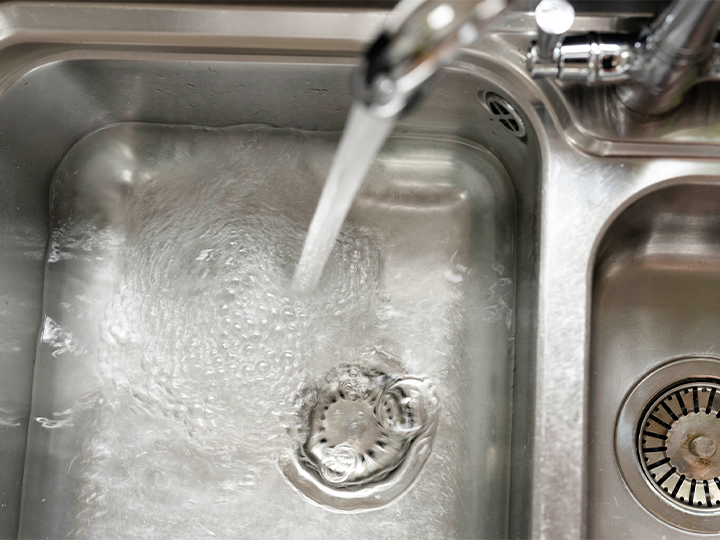Experiencing slow drainage in your sink can be more than just an annoyance—it often signals underlying plumbing problems that need addressing. From the daily routine of washing dishes to brushing your teeth, a fully functional sink is an important component of any household. When water pools more than it drains—disrupting your daily household routine and hygiene practices—it’s a definite sign that something isn’t right.
Clogged Drain Pipes
Slow-draining sinks are often caused by clogged drain pipes. Hair, grease, and soap can build up inside the pipes, creating stubborn blockages. As these materials pile up, they restrict water flow and can eventually lead to noticeable drainage issues. This buildup usually happens gradually, so it might not be obvious until the water starts draining more slowly.
To prevent clogs, regularly clean out any visible debris from sink stoppers and use a drain guard to catch things before they go down the pipes. If you do get a clog, act quickly. You can use chemical drain cleaners, a plunger, or a plumbing snake to clear the blockage and get the water flowing properly again.
Dirty P-Trap
The P-trap, which is the curved pipe under your sink, stops sewer gasses from coming into your home and catches debris. However, it can also get clogged with particles and sludge, causing slow drainage.
To prevent this, check and clean the P-trap regularly. You can do this by removing the curved pipe with basic tools, clearing out any trapped material, and putting it back. This simple task can often fix slow drainage problems quickly.
If your sink still drains slowly after cleaning the P-trap, the blockage might be further down the pipes. In this case, you might need a professional plumber to find and clear the obstruction. Neglecting the P-trap can lead to bigger problems like leaks or water damage. It’s a good idea to understand your plumbing system so you can spot and fix issues early.
Grease Build-Up
In kitchens, grease can often cause sinks to drain slowly. Grease, fats, and oils from cooking can solidify in the pipes, leading to blockages that slow down water flow. Once grease sticks to the pipes, it can trap other debris, making the blockage worse. Even small amounts of grease can build up over time and significantly narrow the pipes, affecting drainage.
To prevent grease clogs, throw away grease and oils in the trash instead of washing them down the sink. This simple step can help reduce the chances of blockages. However, if you think a grease blockage is causing problems, a professional may need to clean the pipes thoroughly. Plumbers have the right tools and techniques to remove stubborn clogs without damaging your plumbing.
Pipe Corrosion or Damage
Over time, pipes can wear out, which can affect how well your sink drains. Corrosion, caused by water and chemicals, can thin out pipes and eventually create holes. Corroded pipes can then slow down water flow and weaken your entire plumbing system. As pipes break down, debris and sediment can build up, causing clogs and slow drainage.
Damage like cracks or breaks can also cause problems by letting water leak out before it reaches the sewer line. These issues are harder to spot since they often happen in pipes that are hidden, like those in walls or underground.
Keep an eye on how quickly your sink drains and check visible pipes for signs of damage or corrosion. If you suspect there’s a problem with hidden pipes, it’s a good idea to call a plumber to check things out and fix any issues before they get worse.
Ventilation Issues
Proper ventilation is key for proper sink drainage. If there isn’t enough airflow to balance the pressure in the pipes, water can trap air, leading to slow and gurgling drains. Problems with the vent system can make this worse.
You might notice your sink draining slowly if the vent pipe on the roof gets blocked by debris like leaves, nests, or snow. Regularly checking and clearing these vents can help keep your drainage smooth.
Sometimes, you might need to add more vents or change the ventilation setup to fix ongoing drainage problems. A professional plumber can evaluate the situation and recommend the best way to improve airflow and drain performance.
Ventilation issues often show up when you use the sink heavily, like when releasing a lot of water at once. If you’re having these problems, get them checked out soon to prevent backflow and more plumbing issues.
Improper Installation
Slow sink drainage can sometimes be due to improper installation. Mistakes during setup, like using the wrong pipe sizes or angles, can block water flow. If the pipes aren’t sloped correctly, gravity won’t move the water efficiently, leading to backups and slow drainage.
You might also have drainage problems if the sink was installed without following local building codes. These codes set standards for plumbing, and not meeting them can cause poor drainage. A certified plumber may need to fix these issues to ensure everything meets the required standards.
Using incompatible plumbing materials can also affect drainage. Pipes and connectors that don’t match properly can create blockages at the joints, slowing down the water flow. If you’re having ongoing drainage issues, it’s worth checking if the installation was done correctly. A professional plumber can inspect the setup and suggest any needed changes to improve drainage.
Your Go-To For All Plumbing Concerns
At Precise Plumbing & Drain, we offer a wide range of plumbing services. We also focus on providing accurate diagnostics and effective solutions tailored to your specific needs. Plus, our experienced technicians utilize state-of-the-art equipment to identify and resolve issues efficiently, ensuring your plumbing system operates smoothly. Whether it’s a routine check-up or a more challenging repair, you can always reach out to us to restore your sink’s performance and keep your home’s plumbing in top condition.



